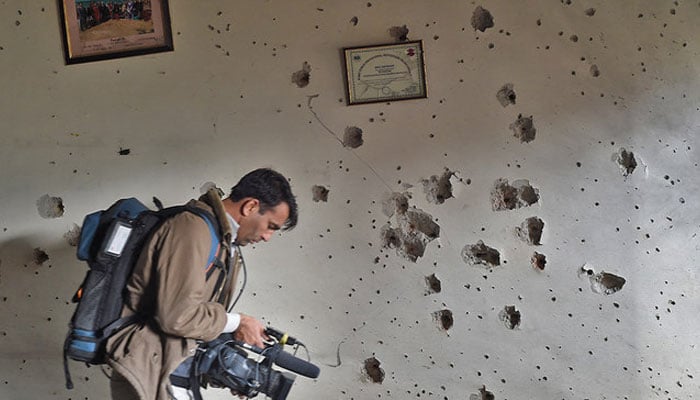Journalists in danger
He regularly covered protests held in different parts of Sindh against the area’s influential landlords
Yet another journalist has lost his life, this time 40-year-old journalist Nasrullah Gadani who worked with a Sindhi daily called ‘Awami Awaz’. Gadani was shot by some unidentified armed men in Ghotki, Sindh a few days ago and succumbed to his injuries on Friday. The now-silent timeline of Gadani on different social media sites shows the work of a journalist who was passionate about holding the powerful to account. He regularly covered protests held in different parts of Sindh against the area’s influential landlords. His wide range of work could easily explain why some thought that his voice had to be silenced. Journalism in Pakistan has become a dangerous territory where investigative stories involving powerful and influential people usually put a journalist’s life in danger. In August 2023, journalist Jan Mohammad Mahar was shot dead by unknown assailants in Sukkur. In 2021, journalist Nazim Jokhio was found dead at a Malir farmhouse.
That Pakistan is an unsafe place for journalists is no secret. The country ranks 152 out of 180 on the World Press Freedom Index compiled by Reporters Without Borders. This year alone, at least five journalists have been killed across the country, reinforcing journalists’ fear that if they cross the invisible red line laid out by the country’s powerful elements, they will be silenced. When the news broke out that Gadani had died, the Sindh Assembly was in session. Reporters in Karachi covering the session staged a walkout and demanded the provincial government arrest his killers. In turn, the Sindh government has vowed to catch the culprits. The Pakistan Federal Union of Journalists (PFUJ) has demanded a commission of complaints be set up according to the Journalists Protection Bill, 2022.
In a democratic country, it is the duty of all political parties, parliament and institutions to ensure that journalists are able to do their work independently and without any fear of reprisal from state or non-state actors. In Pakistan, journalists face a myriad of challenges – some of them ironically from the state itself. Over the years, the threat to journalists has not been restricted to less-privileged areas or the peripheral regions of the country, with known and big-name journalists also facing threats and physical acts of violence in more mainstream cities of the country. It is high time the government introduced strict measures to protect journalists. The powerful should not be allowed to commit crimes against journalists with impunity. Journalists should be given a safe working environment. Such lawlessness will have far-reaching consequences, leading to more anarchy in society. We hope that all of the country’s political parties stand with media freedom in principle and not just pay lip service like they usually do, understanding that when they are in trouble it is the journalist who speaks for them.
-
 Caleb McLaughlin Shares His Resume For This Major Role
Caleb McLaughlin Shares His Resume For This Major Role -
 King Charles Carries With ‘dignity’ As Andrew Lets Down
King Charles Carries With ‘dignity’ As Andrew Lets Down -
 Brooklyn Beckham Covers Up More Tattoos Linked To His Family Amid Rift
Brooklyn Beckham Covers Up More Tattoos Linked To His Family Amid Rift -
 Shamed Andrew Agreed To ‘go Quietly’ If King Protects Daughters
Shamed Andrew Agreed To ‘go Quietly’ If King Protects Daughters -
 Candace Cameron Bure Says She’s Supporting Lori Loughlin After Separation From Mossimo Giannulli
Candace Cameron Bure Says She’s Supporting Lori Loughlin After Separation From Mossimo Giannulli -
 Princess Beatrice, Eugenie Are ‘not Innocent’ In Epstein Drama
Princess Beatrice, Eugenie Are ‘not Innocent’ In Epstein Drama -
 Reese Witherspoon Goes 'boss' Mode On 'Legally Blonde' Prequel
Reese Witherspoon Goes 'boss' Mode On 'Legally Blonde' Prequel -
 Chris Hemsworth And Elsa Pataky Open Up About Raising Their Three Children In Australia
Chris Hemsworth And Elsa Pataky Open Up About Raising Their Three Children In Australia -
 Record Set Straight On King Charles’ Reason For Financially Supporting Andrew And Not Harry
Record Set Straight On King Charles’ Reason For Financially Supporting Andrew And Not Harry -
 Michael Douglas Breaks Silence On Jack Nicholson's Constant Teasing
Michael Douglas Breaks Silence On Jack Nicholson's Constant Teasing -
 How Prince Edward Was ‘bullied’ By Brother Andrew Mountbatten Windsor
How Prince Edward Was ‘bullied’ By Brother Andrew Mountbatten Windsor -
 'Kryptonite' Singer Brad Arnold Loses Battle With Cancer
'Kryptonite' Singer Brad Arnold Loses Battle With Cancer -
 Gabourey Sidibe Gets Candid About Balancing Motherhood And Career
Gabourey Sidibe Gets Candid About Balancing Motherhood And Career -
 Katherine Schwarzenegger Shares Sweet Detail From Early Romance Days With Chris Pratt
Katherine Schwarzenegger Shares Sweet Detail From Early Romance Days With Chris Pratt -
 Jennifer Hudson Gets Candid About Kelly Clarkson Calling It Day From Her Show
Jennifer Hudson Gets Candid About Kelly Clarkson Calling It Day From Her Show -
 Princess Diana, Sarah Ferguson Intense Rivalry Laid Bare
Princess Diana, Sarah Ferguson Intense Rivalry Laid Bare




